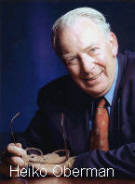
I’ve been in this field for some ten years now, but this fall was my first opportunity to design and teach my own church history course. It was actually a lot harder than I expected it to be. My degree is in religion, but my job is in history, so usually my problem is not knowing enough about the subject matter I’m teaching. (The XYZ Affair? Um, let me look that up.) With church history, though, I had entirely too much material to work with—too many books I wanted to assign, too many possible interpretations, too many people and events I felt obligated to mention. The class was, shall we say, an experiment. So, for any of you who teach church history or would like to learn the good parts of my class without the guinea-pig travails, a few insights:
1. Heiko Oberman’s biography,Luther: Man Between God and the Devil,is outstanding, but it assumes the reader already knows something about its subject. My students did not. They knew basically nothing about church history—but, as I should have remembered, neither did I as an undergraduate. Next time I’ll go with Roland Bainton’s Here I Stand instead.
On the other hand, I was very pleased with the other texts I used: Mark Noll’s Turning Points, Paul Maier’s translation of Eusebius’s Church History, and Tia Kolbaba’s The Byzantine Lists. The last of those just went out of print, but the other two would be great choices for spending your shiny new gift cards.
2. Because the Noll text ends with the 1910 Edinburgh Missionary Conference (a centennial well worth marking in 2010!), I pretty much ended the class at the turn of the century, but I allowed my students to write their final papers on more recent events. This turned out to be a bad idea.
Recent history is tough—there are often too many primary sources available, there’s insufficient historical distance to separate blips from trends, and the secondary literature tends to be written by people with a personal stake in the events about which they write. Of course, no history is impartial, but when people are writing about their own lives, or their own (literal or metaphorical) parents, it’s especially important to evaluate the literature accordingly. I got three papers on events from the 1960s, and I felt bad that I hadn’t given students better critical tools to tackle them.
3. Historical dialogues are a riot. I borrowed this assignment idea from Alan Jacobs, my literary theory professor at Wheaton. Instead of asking his students to write summaries or, heaven help us, analyses of modern literary theorists (more than a few of whom were purposefully abstruse), Dr. Jacobs asked us to write dialogues between the figures we studied. The idea was that a student must really understand where a writer is coming from to be able to put words into his or her mouth.
I modified the assignment slightly for my class but definitely kept students’ freedom to place their characters in the setting of their choice. I got Eusebius lounging in a coffee shop, Thomas Aquinas driving through rural Pennsylvania, Patriarch Michael Cerularius attending a kindergarten graduation, and Martin Luther watching a home shopping channel (and angrily calling to protest the deals on “grace” offered by Johann Tetzel). This was not just a successful academic exercise; it’s a fun game for history buffs to play along at home, too.
4. I know that the best pedagogy is to facilitate students’ discoveries, rather than to serve an elegant platter of one’s own insights, but I had a terrible time holding back this semester. The study of church history has changed me in so many ways, including how I read the Bible, how I understand the human condition, how I define the church, how I relate to other people. A 20-year-old who has just met Constantine for the first time simply cannot absorb all of that, nor will knowledge and experience mix for anyone else the way they mixed for me. Real learning doesn’t fit well into a 15-week space.
Oh well, I tell myself. I’m sure I accomplished something this semester, even if neither I nor my intrepid students could quite articulate what in this post-finals haze. I have faith that church history will grow on them.









